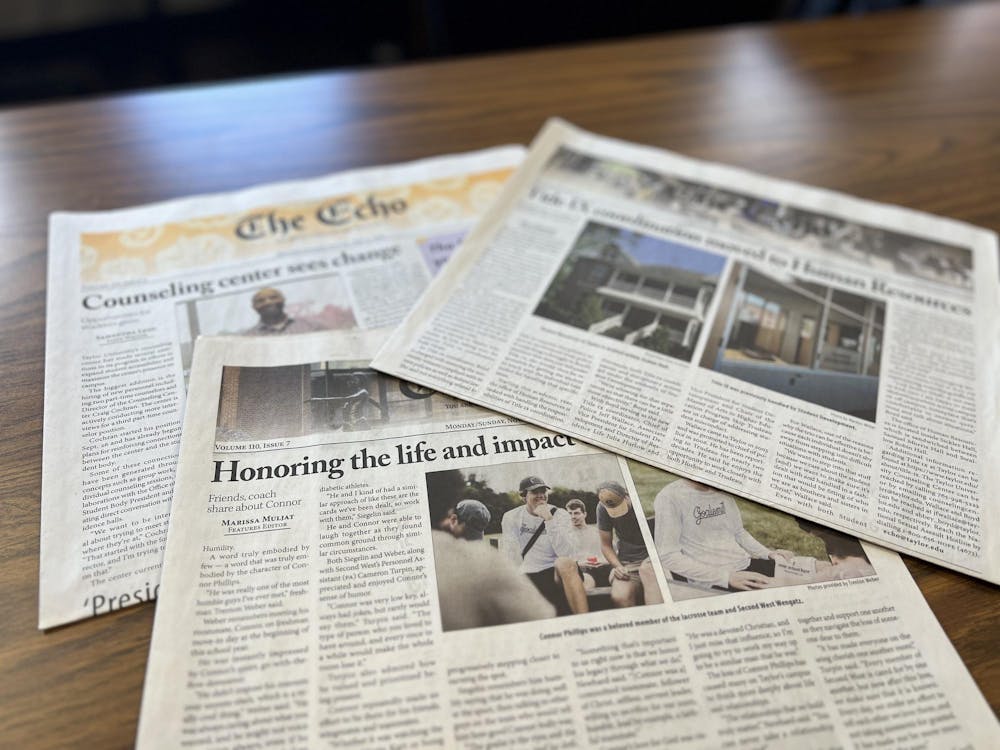Campus newspapers: They are organized, managed and led by their respective students. In 2013 Pew Research estimated there were 1,600 college newspapers in the U.S. The Echo is just one of those. While that number may have changed in the past decade, a campus paper still bears its importance — and for reasons beyond information.
Lee Pitts, executive director of the World Journalism Institute, teaches journalism at Dordt University. He has also advised The Diamond, the campus’s newspaper.
One purpose of the medium, he said, is to provide experience to students collaborating on the paper.
“You could argue that a student newspaper is like a science lab for journalism majors,” Pitts said.
While there are some obvious differences between a biology lab and writing, the principle behind hands-on experience still stands. It is the best way to do “real” journalism, he said.
Aside from its educational facet, a campus newspaper can connect its audience.
“We chronicle a campus to build community,” Pitts said.
Through the medium, students can stay in touch with the larger community of their institution — not just their own neighbors. Sometimes, reporters might cover campus stories in the context of world events to encourage the audience to see beyond their campus bubble.
Michael Longinow, Biola University professor of digital journalism and media, advises the university’s campus newspaper — The Chimes.
Not only is the medium a chance to engage people and alert them, Longinow said it is also the voice of the student body. While the opinions section is an obvious place to voice perspective, the way that writers ask questions and frame other stories — like in news and features — can make an impact as well.
“A student newspaper can advocate for students [and] can ask the important questions that students need to be asking,” he said. “If the university's leadership is smart, they'll read the student newspaper to hear what's going on with students [and ask themselves,] ‘What do they care about? What are their concerns?’ It's an important conduit for student involvement.”
A campus newspaper can advocate and speak truth — even when it is hard to. That sort of voice can initiate change. As wonderful as good news is, he said, a newspaper’s job is not public relations.
This sort of journalistic impact is something that’s been seen not only at Dordt and Biola, but also at Taylor University through The Echo.
Holly Gaskill (‘22) and Ellie Tiemens (‘22), former co-editors in chief at The Echo, experienced firsthand the value that The Echo brings to Taylor’s campus and beyond.
“I think the student newspaper plays an invaluable role to Taylor’s campus, where there’s always a million things going on,” Gaskill said. “Every person has unique stories to share and the school itself is growing and evolving. Beyond that, Taylor’s campus tends to lapse in connection with Upland and Grant County, which have their own events, stories and changes.”
Through its involvement in both campus and local happenings, Gaskill explained how The Echo is able to serve as an avenue to bridge these communities in a single resource — one that informs and entertains its readers.
For Tiemens, community engagement with the student newspaper is something of immense value.
“The Echo is here to be a voice of the campus for the campus,” Tiemens said. “That only works well if students and faculty engage with it regularly.”
Both Gaskill and Tiemens said The Echo can serve as a discussion starter through the sharing of new information, new opinions and new ideas.
After chapel, Tiemens would often find herself sitting in the LaRita Boren Campus Center, watching peoples’ reactions to picking up copies of the newspaper.
“If someone knew the student highlighted in a features article, they would get really excited,” Tiemens said. “Or if a news story was covering a topic they felt really passionate about, they would start to debate with those around them. I think The Echo helped initiate a lot of conversations that made our campus a better place.”
Engagement with The Echo can consist of simply reading articles, responding to articles with a quick email or letter to the editor or sharing story ideas with an Echo staff member, Tiemens explained.
Like Lee and Longinow, Gaskill and Tiemens are grateful for the abundant conversations and opportunities student newspapers offer and encourage.
“Now working at a newspaper full-time, I’m really appreciative of how student media sources are a pathway to creating a habit of being informed and involved in your community,” Gaskill said.





